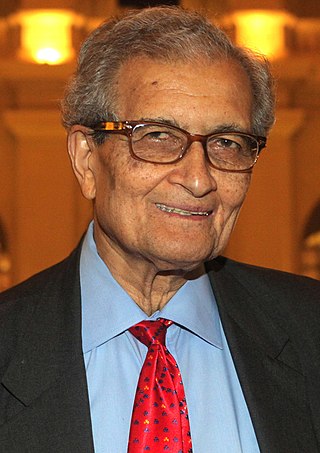Related Research Articles
Ethics is the philosophical study of moral phenomena. Also called moral philosophy, it investigates normative questions about what people ought to do or which behavior is morally right. The main branches of ethics include normative ethics, applied ethics, and metaethics.
Hedonism refers to the prioritization of pleasure in one's lifestyle, actions, or thoughts. The term can include a number of theories or practices across philosophy, art, and psychology, encompassing both sensory pleasure and more intellectual or personal pursuits, but can also be used in everyday parlance as a pejorative for the egoistic pursuit of short-term gratification at the expense of others.
Relativism is a family of philosophical views which deny claims to objectivity within a particular domain and assert that valuations in that domain are relative to the perspective of an observer or the context in which they are assessed. There are many different forms of relativism, with a great deal of variation in scope and differing degrees of controversy among them. Moral relativism encompasses the differences in moral judgments among people and cultures. Epistemic relativism holds that there are no absolute principles regarding normative belief, justification, or rationality, and that there are only relative ones. Alethic relativism is the doctrine that there are no absolute truths, i.e., that truth is always relative to some particular frame of reference, such as a language or a culture. Some forms of relativism also bear a resemblance to philosophical skepticism. Descriptive relativism seeks to describe the differences among cultures and people without evaluation, while normative relativism evaluates the word truthfulness of views within a given framework.
Moral relativism or ethical relativism is used to describe several philosophical positions concerned with the differences in moral judgments across different peoples and cultures. An advocate of such ideas is often referred to as a relativist.

Amartya Kumar Sen is an Indian economist and philosopher. Sen has taught and worked in England and the United States since 1972. In 1998, Sen received the Nobel Memorial Prize in Economic Sciences for his contributions to welfare economics. He has also made major scholarly contributions to social choice theory, economic and social justice, economic theories of famines, decision theory, development economics, public health, and the measures of well-being of countries.
Cultural relativism is the position that there is no universal standard to measure cultures by, and that all cultural values and beliefs must be understood relative to their cultural context, and not judged based on outside norms and values. Proponents of cultural relativism also tend to argue that the norms and values of one culture should not be evaluated using the norms and values of another.
A worldview or a world-view or Weltanschauung is the fundamental cognitive orientation of an individual or society encompassing the whole of the individual's or society's knowledge, culture, and point of view. A worldview can include natural philosophy; fundamental, existential, and normative postulates; or themes, values, emotions, and ethics.
This index of ethics articles puts articles relevant to well-known ethical debates and decisions in one place - including practical problems long known in philosophy, and the more abstract subjects in law, politics, and some professions and sciences. It lists also those core concepts essential to understanding ethics as applied in various religions, some movements derived from religions, and religions discussed as if they were a theory of ethics making no special claim to divine status.
In ethics, welfarism is a theory that well-being, what is good for someone or what makes a life worth living, is the only thing that has intrinsic value. In its most general sense, it can be defined as descriptive theory about what has value but some philosophers also understand welfarism as a moral theory, that what one should do is ultimately determined by considerations of well-being. The right action, policy or rule is the one leading to the maximal amount of well-being. In this sense, it is often seen as a type of consequentialism, and can take the form of utilitarianism.
Asian values is a political ideology that attempts to define elements of society, culture and history common to the nations of Southeast and East Asia. It aimed to use commonalities – for example, the principle of collectivism – to unify people for their economic and social good. This contrasted with perceived European ideals of the universal rights of all individuals. The concept was advocated, particularly in the 1990s, by Mahathir Mohamad and by Lee Kuan Yew, as well as other Asian leaders. It has been often used by nondemocratic leaders to justify repression of political opponents, which has been described as violating their human rights, through the justification that "human rights are not part of Asian values".
Lawrence Kohlberg's stages of moral development constitute an adaptation of a psychological theory originally conceived by the Swiss psychologist Jean Piaget. Kohlberg began work on this topic as a psychology graduate student at the University of Chicago in 1958 and expanded upon the theory throughout his life.
A value judgment is a judgment of the rightness or wrongness of something or someone, or of the usefulness of something or someone, based on a comparison or other relativity. As a generalization, a value judgment can refer to a judgment based upon a particular set of values or on a particular value system. A related meaning of value judgment is an expedient evaluation based upon limited information at hand, where said evaluation was undertaken because a decision had to be made on short notice.
Philosophy and economics studies topics such as public economics, behavioural economics, rationality, justice, history of economic thought, rational choice, the appraisal of economic outcomes, institutions and processes, the status of highly idealized economic models, the ontology of economic phenomena and the possibilities of acquiring knowledge of them.
This glossary of philosophy is a list of definitions of terms and concepts relevant to philosophy and related disciplines, including logic, ethics, and theology.
In ethics and social sciences, value denotes the degree of importance of some thing or action, with the aim of determining which actions are best to do or what way is best to live, or to describe the significance of different actions. Value systems are proscriptive and prescriptive beliefs; they affect the ethical behavior of a person or are the basis of their intentional activities. Often primary values are strong and secondary values are suitable for changes. What makes an action valuable may in turn depend on the ethical values of the objects it increases, decreases, or alters. An object with "ethic value" may be termed an "ethic or philosophic good".

Shalom H. Schwartz is a social psychologist, cross-cultural researcher and creator of the Theory of Basic Human Values. He also contributed to the formulation of the values scale in the context of social learning theory and social cognitive theory.

Patterns of Sexual Behavior is a 1951 book by anthropologist Clellan S. Ford and ethologist Frank A. Beach, in which the authors integrate information about human sexual behavior from different cultures, and include detailed comparisons across animal species, with particular emphasis on primates. The book received positive reviews and has been called a classic. It provided the foundation for the later research of Masters and Johnson.
Values scales are psychological inventories used to determine the values that people endorse in their lives. They facilitate the understanding of both work and general values that individuals uphold. In addition, they assess the importance of each value in people's lives and how the individual strives toward fulfillment through work and other life roles, such as parenting. Most scales have been normalized and can therefore be used cross-culturally for vocational, marketing, and counseling purposes, yielding unbiased results. Psychologists, political scientists, economists, and others interested in defining values, use values scales to determine what people value, and to evaluate the ultimate function or purpose of values.

The theory of basic human values is a theory of cross-cultural psychology and universal values that was developed by Shalom H. Schwartz. The theory extends previous cross-cultural communication frameworks such as Hofstede's cultural dimensions theory. Schwartz identifies ten basic human values, each distinguished by their underlying motivation or goal, and he explains how people in all cultures recognize them. There are two major methods for measuring these ten basic values: the Schwartz Value Survey and the Portrait Values Questionnaire.
References
- Bolin, Anne, and Patricia Whelehan (1999). Perspectives on Human Sexuality. SUNY Press.
- Diamond, Larry Jay, and Marc F. Plattner (2001). The Global Divergence of Democracies. Johns Hopkins University Press.
- Jahanbegloo, Ramin, (1991). Conversations With Isaiah Berlin. McArthur & Co. Reprinted 2007, Halban Publishers. ISBN 1-905559-03-8, ISBN 978-1-905559-03-9
- Mason, Elinor, (2006). 'Value pluralism'. In The Stanford Encyclopedia of Philosophy. (Accessed 13 Nov 2007).
- Pettit, Philip (1996). The Common Mind: An Essay on Psychology, Society, and Politics. New York: Oxford University Press.
- Schwartz, S. H. (1992). 'Universals in the Content and Structure of Values: Theory and Empirical Tests in 20 Countries'. In M. Zanna (ed.), Advances in Experimental Social Psychology (Vol. 25). New York: Academic Press: 1-65.
- Schwartz, S. H. (1994). 'Are there Universal Aspects in the Structure and Contents of Human Values?'. Journal of Social Issues , 50 (4): 19–45.
- Schwartz, S. H. and W. Bilsky (1987). 'Toward a Universal Psychological Structure of Human Values'. Journal of Personality and Social Psychology , 53: 550-562.
- Sen, Amartya (1999). 'Democracy as a Universal Value'. Journal of Democracy, 10 (3): 3-17.